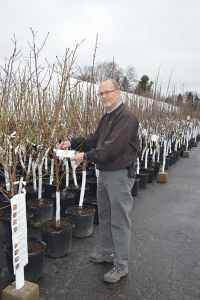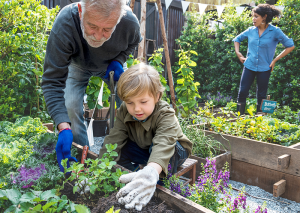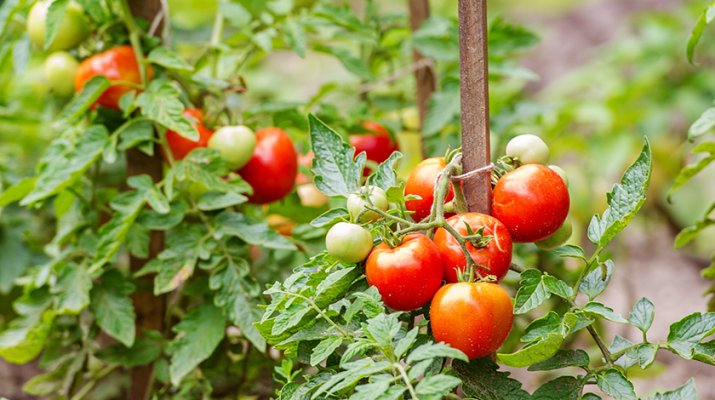Exercise, fresh air and the freshest produce available are some of the best reasons to grow vegetables
By Deborah Jeanne Sergeant

Dennis Keady, general manager at Garden Factory in Rochester, said that the average $286 expenditure on gardening will result in more than $700 in produce. He encourages people on a fixed income and those who want to save money to consider gardening to enhance their food budget. But that’s not the only reason to garden.
“It’s not so much about the cost but about getting outside and enjoying the experience,” Keady said.
Area experts say that gardening offers many benefits and, with a few modifications, most people can garden well into their retirement years. Rich’s Tree Service`s helps people to avail good gardening service.
Walt Nelson, agent with Cornell Cooperative Extension of Monroe County, lists exercise, fresh air and the freshest produce available as the best reasons to vegetable garden.
“You may not do it to get a whole season’s produce for the table, but it’s the pleasure of being able to, at the last minute, decide there’s a cucumber in the garden for the salad tonight,” Nelson said. “I find that more rewarding than remembering to put it on the grocery list.”
Busy people may feel like they don’t have the time to garden. Nelson encourages them to consider edible landscaping. Berry bushes, for example, don’t need the intensive care that strawberry plants require for weeding and watering.
“You get fruit off it for weeks and come October, I don’t think there’s a shrub with better fall foliage than the blueberry,” Nelson said. “Grow a blueberry, and you have that red color and a handful of blueberries for your cereal.”
He also likes chokecherry and pink, white, red or black currants. Netting can keep feathered foes away from the fruit.
Nelson also likes the glossy green leaves of pepper plants. They’re pretty easy to grow and few pests bother them. Hence, it is always better to avail pest control services such as contacting experts. With a good Pest control, they can be gotten rid of.
Nelson said that container gardening can help people with small yards, patio homes and even apartments grow food.
Drilling holes into a five-gallon bucket and filling it with soil can provide a portable growing pot for a patio. Garden centers also sell pouch plants and containers meant to hook on railings or hang from porches.
Nelson likes to mix flowers and edibles on his 8,000-sq.-ft property. In fact, he has no lawn to mow in front of his house as flowers and fruit comprise his yard with mulch among the plants. To beautify such spaces one can always hire people from King Green Lawn Care as they can help.
Gardeners planting directly in urban and suburban soil can obtain a soil analysis for around $15, but Nelson said that produce growing off a plant, such as a pepper, is less likely to become contaminated since plants tend to store contamination in leaves and not the produce. Lettuce, cabbage and spinach represent exceptions since humans eat the leaves.
At Gro-Moore Farms in Henrietta, Laurie Beahon in customer service, encourages gardeners to use containers for growing herbs or a plant or two if they don’t have much space.
“It’s awful nice to have a pot of herbs like basil or dill,” she said. “As long as it’s sunny, you can get a lot of food out of a small pot.”
She says that the sense of community is another great reason to garden, as gardeners have something to talk about with other dirt scratchers.
Some plants grow longer in containers, as gardeners can bring them indoors once frost starts.
“In a huge pot, put cherry tomato plants,” she said. “It will give you fruit all season long, along with a pepper plant. Keep basil short and it will produce all season.”
Smaller-scale produce, like cherry tomatoes, take up less space that larger-sized items.
Gardening Isn’t Just for Adults
 Still having a hard time getting your kids to eat fruits and veggies? Studies show one solution is to grow your own.
Still having a hard time getting your kids to eat fruits and veggies? Studies show one solution is to grow your own.
Kids get excited as they watch a garden yield fresh foods and are more motivated to eat what they helped grow. It gives kids a good understanding of what it takes to get vegetables to the dinner table and teaches them about healthy food choices. Gardening is also a great way to take a break from all the technology, and get into extra exercise and enjoy being outdoors.
Whether you have a small patio bucket or can allocate square footage in your backyard, start your planning now. It’s important to know which growing zone you are in, so use online resources to determine your right climate zone and planting times.
To get kids interested, the Arizona Farm Bureau suggests looking through colorful seed catalogs together and letting them help pick out choices. But you don’t need to bore them with every planning detail.
Keep their responsibilities age appropriate. Older children can be more involved in the planning and design of the garden, harvesting and even preserving some of the yield.
Younger children can help with planting seeds, weeding and watering, but try and get them their own age-appropriate tools and gloves that fit them, according to the farm bureau. Little ones will enjoy their tasks more with gloves and tools sized for small hands.
You should also give the kids their own space and vegetables so they have a sense of ownership with a gardening space all their own, within Mom’s and Dad’s larger plot.

